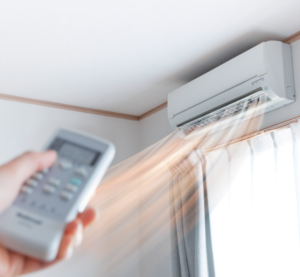
Your air conditioner is one of the most important appliances in your home. Not only does it keep you cool during the summer, but it also helps circulate the air to make sure everything smells fresher and feels better inside. When choosing an AC unit, there are many factors to consider—and since you’re not buying them every day, it can be hard to know exactly what you need. That’s why we put together this handy guide with five key points that will help ensure you find the best unit for your needs:
Choose a size appropriate for your space
When outfitting a new house, you’ll often need to choose between larger and smaller models. The same idea applies when shopping for an AC unit. Since the goal is to keep everyone as comfortable as possible without wasting too much energy or money, it’s important to look at the square footage of your space and buy a unit that is the right size. To do this, use a special tool (they’re available online) to measure the area of your space in feet. Then, round up slightly and only buy an AC unit with about five or 10 percent more BTUs than what you calculated. You can always adjust it down if needed, but having enough power means you’ll save more in the long run.
Find out which energy efficiency standards are right for you
Most of us want to find the most efficient unit we can—and for good reason. Spending less on electricity means you’ll save money and won’t feel guilty about the impact your AC has on the environment. When shopping, look for a model that fits into one of three categories: Energy Star-certified, AHAM-certified, and ENERGY STAR + CEE Tier 1. The more energy efficient a unit is, the higher it will typically cost—but these certifications ensure that it meets a certain standard of performance.
Consider how much insulation or extra features would benefit your system
Some ACs come with features that can help your system be more efficient. For example, a unit with an automatic thermostat will cycle on and off as needed to get the temperature just right. This means you don’t have to keep setting up your thermostat and getting frustrated when it starts blasting hot air. Other options, like a self-evaporating system, can help you save money on expensive chemicals. The best ACs will have a few of these features to help your system run as efficiently as possible and last longer.
Consider extended warranties
When you spend a lot of money on something, it makes sense to protect your investment. A service plan can give you peace of mind and help repair your unit faster if anything does go wrong. Most people don’t know that extended warranties typically cover both labor and parts. If something breaks down, it can be replaced quickly and at no additional cost. Also, some ACs require extra care due to the chemicals inside (like the coolant or lubricants). You might need a service plan to make sure your unit is properly maintained and doesn’t break down during the warranty period.
Think about how much noise your new unit will make
An AC’s sound level is measured in decibels. The higher it is, the louder it will typically be. Underneath your unit, you should find a sticker that lists its sound level and lets you know if it’s bearable for sleeping or not. If you’re replacing an old unit, it’s worth investing in one that has a quieter sound level than the one you already have—especially if you plan to spend significant amounts of time in your space during the summer.
Air Conditioning Installation Cost
When it comes to AC installation, some people prefer to do the work themselves. AC units are huge and heavy, making it impossible for most people. Blocking the duct yourself can be dangerous if you don’t know what you’re doing. If you decide to DIY, find a professional to check the job. Make sure everything is sealed properly before turning on the AC. This can save you thousands of dollars in repairs.
air conditioner type
There are several types of air conditioners from window units to central air systems.
Window style AC
Window-style ACs are the most common and the least expensive because they only need a hole cut in your wall and installed inside your home. Central AC systems tend to be more efficient and therefore cost more money and require professional installation and maintenance.
Ductless mini-split systems
A ductless mini-split system is a compact unit that can cool your home without a duct or central compressor unit. It does not need to be sealed to the exterior walls of the house, so it is ideal for homes with few windows. The ductless mini-split system requires only drilling holes in the exterior wall. It can be hidden by interior walls or furniture. They also typically offer 15-20 year warranties for internal components.
Coldwater systems
Water-cooled air conditioners use an outdoor compressor or duct. Instead, cold water is used to cool the hot refrigerant. Because there is no outdoor unit, it is inexpensive and easy to install under a sink or in an enclosed space. It is not as common as other types of AC systems. Instead, it works well in areas where ductwork is impractical or impossible to install (eg apartments with many walls dividing living rooms).
Conclusion
An air conditioning unit can help keep your home or workspace comfortable through even the hottest days of summer. To pick out the best one, use this guide to understand how much BTU power you need, which energy-efficient options are right for you, and what extra features can extend the life of your system. With a little research, you’ll be able to find an affordable AC that fits your budget and needs perfectly.
You can view recommended air conditioner products at the following website.
